|
|
|
Sort Order |
|
|
|
Items / Page
|
|
|
|
|
|
|
| Srl | Item |
| 1 |
ID:
049639
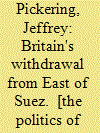

|
|
|
|
|
| Publication |
Hampshire, macmillan Press, 1998.
|
| Description |
xi, 231p.
|
| Series |
Contemporary history in context
|
| Standard Number |
0333695267
|
|
|
|
|
|
|
|
|
|
|
|
Copies: C:1/I:0,R:0,Q:0
Circulation
| Accession# | Call# | Current Location | Status | Policy | Location |
| 043112 | 327.4105/PIC 043112 | Main | On Shelf | General | |
|
|
|
|
| 2 |
ID:
101329
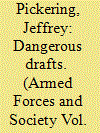

|
|
|
|
|
| Publication |
2011.
|
| Summary/Abstract |
Conscription has been claimed to both increase leaders' propensity to use military force abroad and constrain them from doing so. The author sheds new light on this longstanding controversy by presenting the first time-series, cross-national quantitative analysis of the impact that state military manpower systems (either conscription or volunteerism) have on the initiation of both traditional, belligerent military missions and "operations other than war" (OOTWs). Using negative binomial regression on 166 states from 1946 to 2001, the author finds that states with conscript militaries have a significantly higher propensity to use belligerent military force than states with volunteer armies. Countries that practice conscription are also more likely than countries with volunteer forces to launch a specific type of OOTW, military operations against nonstate actors such as rebels or terrorists. Neither form of military manpower system seems, however, to be significantly related to the initiation of humanitarian military operations.
|
|
|
|
|
|
|
|
|
|
|
|
|
|
|
|
| 3 |
ID:
060419
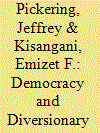

|
|
|
|
|
| Publication |
Mar 2005.
|
| Summary/Abstract |
This article concentrates on two limitations in the literature on diversionary force. First is the common assumption that major powers are the only actors capable of diversion. Second is the narrow conceptualization of regime type prevalent in the literature. Instead of dichotomizing regimes, we distinguish mature democracies and autocracies from consolidating variants of these regimes. We draw hypotheses from the institutional approach and test them with time series cross-section negative binomial first-order autoregressive process estimates of 140 countries from 1950 to 1996. We find that not all democracies and not all autocracies divert. Mature democracies, consolidating autocracies, and transitional polities are the only regime types prone to this type of force. Our results suggest that the diversionary literature would benefit from more discriminating operationalizations of regime type and by looking beyond major powers to the actions of less powerful states.
|
|
|
|
|
|
|
|
|
|
|
|
|
|
|
|
| 4 |
ID:
109937
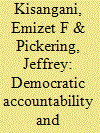

|
|
|
|
|
| Publication |
2011.
|
| Summary/Abstract |
Agreement on which democratic regime types are prone to use diversionary force has yet to materialize in the embryonic empirical literature on the subject. Nor has consensus emerged on the theoretical approach that best explains the diversionary tendencies of different democratic political systems. By separating out benevolent and belligerent diversionary military missions, we begin to offer some clarity to this mixed empirical literature. In zero-inflated Poisson estimates of fifty-six democracies from 1950 to 2004, we find compelling evidence that a theoretical framework emphasizing leader accountability best explains democratic diversionary behavior. More accountable democratic executives (leaders of majoritarian, weak-party majority, and minority governments) appear significantly more likely to use diversionary force than counterparts with less accountability (especially in coalition governments). Democratic leaders also seem to use benevolent military force for diversionary purposes more often than belligerent force, though they still use the latter in specific contexts.
|
|
|
|
|
|
|
|
|
|
|
|
|
|
|
|
| 5 |
ID:
073547
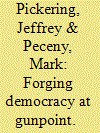

|
|
|
|
|
| Publication |
2006.
|
| Summary/Abstract |
Can liberal interventionism build liberal democracy? This manuscript examines the military interventions undertaken by the U.S., U.K., France, and the UN in the post-World War II era to see if they had a positive impact on democracy in target countries. Empirical analysis centers on multivariate time series, cross section PCSE and relogit regressions of political liberalization and democratization from 1946 to 1996. The former is operationalized with annual difference data drawn from the Polity IV data collection, whereas the latter is a binary variable denoting countries that cross a threshold commonly used to indicate the establishment of democratic institutions. An updated version of the International Military Intervention data set enumerates foreign military interventions. We find little evidence that military intervention by liberal states helps to foster democracy in target countries. Although a few states have democratized in the wake of hostile U.S. military interventions, the small number of cases involved makes it difficult to draw generalizable conclusions from the U.S. record. We find stronger evidence, however, that supportive interventions by the UN's "Blue Helmets" can help to democratize target states.
|
|
|
|
|
|
|
|
|
|
|
|
|
|
|
|
| 6 |
ID:
151711


|
|
|
|
|
| Summary/Abstract |
The empirical international conflict literature has given much recent attention to interstate armed force’s impact on human well-being. While empirical research has advanced our understanding of the phenomenon considerably, we argue that one conclusion that many studies have reached is preliminary. Some recent research contends that only full-scale war, and not force short of war, has a discernable impact on human welfare or physical quality of life (PQOL). We develop theory on one type of force short of war, large-scale foreign military intervention (FMI), and its potential effects on PQOL. Using interrupted time series and panel corrected standard error methodologies, we find that from 1960 to 2005 large-scale FMI had a statistically and substantively significant impact on the PQOL of populations in 106 developing countries. The specific effect that this type of armed force has depended in large part on the regime type of the target country.
|
|
|
|
|
|
|
|
|
|
|
|
|
|
|
|
| 7 |
ID:
090142
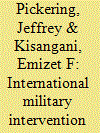

|
|
|
|
|
| Publication |
2009.
|
| Summary/Abstract |
As major wars have become uncommon over recent decades and the efficacy of economic sanctions is questioned, foreign military intervention seems to have become increasingly prevalent on the international scene. Military intervention has also gained a degree of moral legitimacy, as it is now often launched for humanitarian ends rather than simply to further the intervener's strategic or material interests. Despite the apparent increase in the use of foreign military intervention as a policy tool in recent years, the quantitative international conflict literature continues to operate without either a comprehensive or a current inventory of foreign military interventions. The authors attempt to fill this gap by updating Pearson & Baumann's International Military Intervention (IMI) dataset from 1989 to 2005. IMI has a number of attributes that should make it attractive to quantitative international conflict scholars. One is that it is one of a small handful of interstate conflict datasets that attempts to discern the motives behind state uses of force. Also, its substantive coverage is broad, allowing researchers to separate out and focus on the forms of intervention (supportive, hostile, humanitarian, territorial, etc.) that are relevant to their research. As a preliminary validity test of the updated data, the authors analyze patterns of Cold War and post-Cold War military intervention in the IMI collection to see if they correspond with conventional wisdom on real world events.
|
|
|
|
|
|
|
|
|
|
|
|
|
|
|
|
| 8 |
ID:
131009
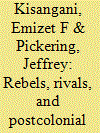

|
|
|
|
|
| Publication |
2014.
|
| Summary/Abstract |
A recent, notable strain of empirical research argues that postcolonial state-building follows a pattern similar to the European state-building experience. It acknowledges that war is less common today, but contends that interstate rivalry now drives state-building. We argue that postcolonial state-managers have little reason to build state capacity in response to rival states. There is only a slight chance that these rivalries will escalate into an existential threat for the government. Attention should instead be focused on the more tangible threat posed by transnational rebels and postcolonial governments' use of low-scale military force to combat such non-state actors. Using interrupted time series methodology on a sample of 72 countries from 1972 to 2002, we find that postcolonial state military intervention against transnational rebels increases direct taxes (a measure of state penetration) and non-tax revenue (state autonomy) collected by governments, while intervention against rival states reduces direct taxation.
|
|
|
|
|
|
|
|
|
|
|
|
|
|
|
|
|
|
|
|
|